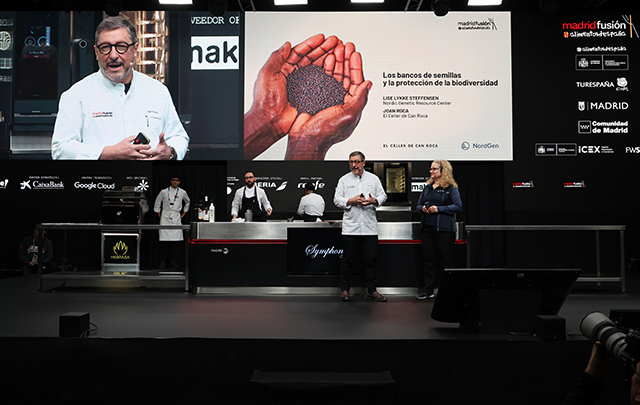News
The future of biodiversity in the hands of chefs too

In a world that does not realise that it is losing biodiversity, the work of seed banks must be highlighted
The joint presentation by Joan Roca, El Celler de Can Roca*** (Girona), and Lise Lykke Steffensen, Executive Director of the Nordic Centre for Genetic Resources (Alnarp, Sweden), was a cry of alarm about the need to halt the loss of biodiversity on the planet. According to the FAO, ¾ of agricultural varieties have already been lost, and to combat this trend, gene banks are working to conserve seed samples of different species.
Both the chef and the scientist have warned of the rapid extinction of certain natural resources, because "the speed at which climate change is acting does not allow plants to adapt to the new situation", says Steffensen. Faced with this problem, seed banks act as a retaining wall by collecting and preserving samples of different species, thus guaranteeing that "we will have melons or strawberries in the future if their cultivation disappears", Lysse told the audience.
Given the importance of gene banks, the head of the Nordic Centre for Genetic Resources encouraged chefs to "go to these banks, explore them, talk to them. Because the more they are used, the more resources will come into these banks, and the more biodiversity can be saved", she urged. This call was echoed by Joan Roca, who explained the need to preserve all this wealth that is being lost, "because the disappearance of seeds also means the loss of part of our culture and tradition, and so we too, as chefs, must demand that producers recover these species that are no longer used".
There are 1,700 seed banks in the world (20 of them in Spain) and their work is protected by the Nordic Genetic Resource Centre, a seed security bank that holds copies of all the seeds collected by the different gene banks.
Steffensen also highlighted another parallel problem, that of the use and cultivation of the same species. "There are more than 30,000 edible plants in the world, but we currently eat only about 150 of them. Many varieties, but the same species", said the biologist, urging the chefs attending the congress to broaden their horizons. "You, chefs, are role models for consumers, open up the range of species you use in the kitchen". An advice that the Celler de Can Roca has been following for some time, and which has even led them to create dishes "with so-called weeds, such as nettles", explained Joan Roca.
